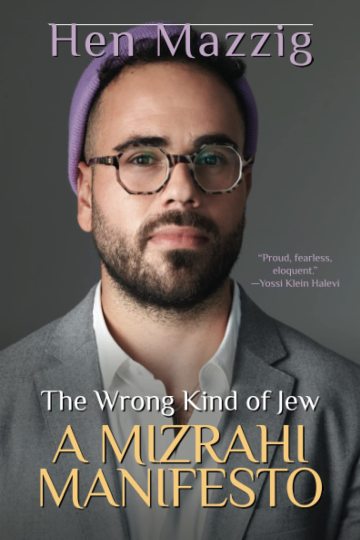Hen Mazzig
THE WRONG KIND OF JEW: A MIZRAHI MANIFESTO
Wicked Son Book, 2022: ISBN 978-64293-723-7
Reviewed by Ruth Ohayon1
The Wrong Kind of Jew: A Mizrahi Manifesto is a memoir and a manifesto. Hen Mazzig explores the nature and challenges of his multifaceted Jewish identity. He strives to educate Jews and non-Jews about the Jewish story, the diversity of the Jewish people in Israel, and across the world.
Hen Mazzig’s family originates from North Africa and the Middle East, more specifically, Tunisia and Iraq. He identifies himself as a social media influencer, a Mizrahi activist, and a member of the LGBTQ community. Mazzig, as the provocative title implies, does not fit stereotypes of what being Jewish is, or Israeli or Mizrahi.
Mazzig reviews the history of the Mizrahi Jews from North Africa and the Middle East, the struggles they faced in Arab countries, and the difficulties they encounter in Israel today. We learn that:
Even within the Diaspora Jewish community itself, most people don’t even know that close to a million Jews from Arab and Muslim countries fled centuries-long persecution only to be pushed to the back of the bus in their ancestral homeland and rendered invisible around the world (p. 156).
The Mizrahi Jewish community’s history, Mazzig states, has been erased from international academic and public discourse (p. 164). Mizrahim experienced racism and anti-Semitism in their homelands. Muslim regimes treated Jews as less than equal under the law. They could not bear arms, break curfews, build synagogues as high as mosques, wear clothes without Jewish symbols, and were forced to pay taxes so as not to be murdered (p. 190).
The text is composed of an Introduction and five chapters. In “Hating Hen,” the author describes how he experienced hate from right-wingers and politically conservative Jews. This led to protests at his speaking engagements and vitriolic responses to his articles in newspapers. He writes, “Something about me--my unusual combination of being outspoken, Zionist, gay, and non-white” played a role (p. 28). One aspect of his identity especially provoking was namely that he is Mizrahi.
In “The Mizrahi Story,” his father’s lineage is traced to the indigenous Amazigh (Berbers) of North Africa. His mother’s family came from Iraq, which was known as Babylonia. Mizrahi identity, according to Mazzig, refers to “a cultural-ethnic term that describes our shared history dating back to the Islamic conquests of the seventh and eighth centuries, rather than Sephardi, a religious term dating back to the fifteenth” (p. 79). It is only after he moved to the United States in 2012 that he was ready to write about his family’s history, traditions and the Mizrahi culture.
Hen Mazzig recounts how he finally came out as gay to his friends and family after five years in military service. In “Coming Out, Twice,” he adds, “My second coming out was well under way before I even knew it” (p. 124).
Mizrahi Jews feel invisible within Israel and in the Diaspora, as Hen Mazzig argues, “we are marginalized in Israel and erased in the Diaspora” (p. 146). In Israel, where more than 50% of Jews are Mizrahi, they are the dominant force, although they suffer discrimination. And yet Ashkenazim dominate every institution. The author explains, “Time and time again as I’ve navigated from early adulthood to my military service to seeking employment in the professional world, I’ve been made to feel ‘less than’ for my Mizrahi background” (p. 142). In the chapter, “Jews Will not Erase Us,” he importantly notes that in the Diaspora Jewish community many don’t know that almost a million Jews from Arab and Muslim countries were persecuted for centuries. He feels that Mizrahim today need to create their own voice.
The final chapter, “The Mizrahi Manifesto,” echoes part of the title. A manifesto is a declaration of one’s intentions and goals, and the purpose is to create a plan to effect change. The erasure and exclusion of the Mizrahi Jewish community from public discourse, according to Hen Mazzig, needs to be redressed:
We just want our faces, histories, and traditions to be seen as an integral part of the Jewish experience, rather than an alien or exotic permutation (p. 164).
Mazzig urges the reader to continue advocating for Mizrahi Jews, and empowering their culture and rights. Teaching Mizrahi heritage should be an integral part of an ethnic studies curriculum (p. 221).
The Wrong Kind of Jew: A Mizrahi Manifesto by Hen Mazzig is enlightening as the author explores the complexities of Mizrahi identity and exposes the attendant political and social ramifications. I enjoyed the informal and conversational style of his personal account. I hope that the Mizrahi story takes center stage after dwelling unrecognized in the shadows for centuries.
1 Ruth Ohayon, PhD, is Professor Emerita at Westfield State University in Massachusetts. She focuses on postcolonial literature, Francophone women writers, Caribbean, and diasporic studies. She recently taught a course on the Literature of the Holocaust.
Copyright by Sephardic Horizons, all rights reserved. ISSN Number 2158-1800

